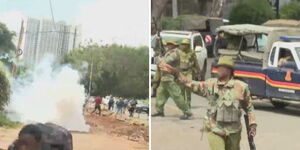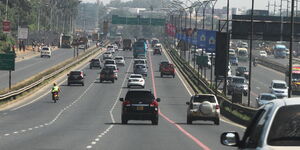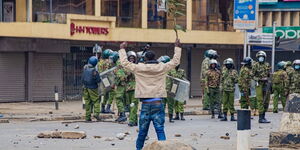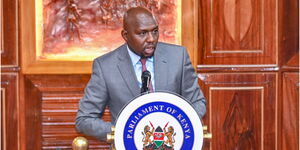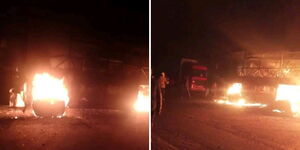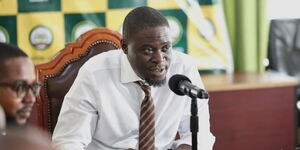The International Criminal Court (ICC) has finally made its ruling on a No-Case-to-Answer petition filed by Deputy President William Ruto and radio journalist Joshua Sang.
The Court on Tuesday decided that Mr Sang and Mr Ruto had no case to answer.
"The charges are hereby vacated and the accused are discharged from the process without prejudice to their presumption of innocence or the prosecutors right to re-prosecute at a later time," Judge Eboe Esuji said in a statement.
UPDATE 1: Here is the video and full press release from the ICC
[video:]
Today, 5 April 2016, Trial Chamber V(A) of the International Criminal Court (“ICC” or “Court”) decided, by majority, Judge Olga Herrera Carbuccia dissenting, that the case against William Samoei Ruto and Joshua Arap Sang is to be terminated. According to the majority, this decision does not preclude new prosecution in the future either at the ICC or in a national jurisdiction. This decision may be subject to appeal.
The Chamber considered the requests of Mr Ruto and Mr Sang that the Chamber find that there is ‘no case to answer’, dismiss the charges against both accused and enter a judgment of acquittal. The Chamber also considered the opposing submissions of the Prosecutor and the Legal Representative of the Victims, and received further submissions during hearings held from 12 to 15 January 2016.
On the basis of the evidence and arguments submitted to the Chamber, Presiding Judge Chile Eboe-Osuji and Judge Robert Fremr, as the majority, agreed that the charges are to be vacated and the accused are to be discharged. They provided separate reasons for this decision.
Judge Fremr found that there is no case for the accused to answer based on an assessment of the Prosecution’s evidence in accordance with the Trial Chamber’s Decision of 3 June 2014, which outlined the principles and procedure for the Defence’s submissions of no case to answer.
In his view, the Prosecution did not present sufficient evidence on which a reasonable Trial Chamber could convict the accused. Accordingly, he considered that there is no reason to call the Defence to bring their case or to prolong the proceedings any further.
Judge Eboe-Osuji, concurring with Judge Fremr’s evidential assessment, also vacated the charges and discharged the accused without prejudice to re-prosecution in the future. However, he declared a mistrial in the case, because it cannot be discounted that the weaknesses in the Prosecution case might be explained by the demonstrated incidence of tainting of the trial process by way of witness interference and political meddling that was reasonably likely to intimidate witnesses.
In his opinion, Judge Eboe-Osuji also discussed several matters including reparations, immunities and elements of the “crimes against humanity” definition.
The majority of the Chamber, having concluded that the Prosecution did not present sufficient evidence on which a reasonable Trial Chamber could convict the accused, also concluded that a judgment of acquittal was not the right outcome, but only vacation of the charges and discharge of the accused. The majority also agreed that there is no reason to re-characterise the charges.
Judge Herrera Carbuccia appended a dissenting opinion. In her view, the charges against both accused should not be vacated in the present case as such outcome departs from the legal standard established in the Trial Chamber’s Decision of 3 June 2014.
Judge Herrera Carbuccia considered that the Prosecution case had not ‘broken down’ and she concluded that there is sufficient evidence upon which, if accepted, a reasonable Trial Chamber could convict the accused.
Read Also: ICC Rejects Recanted Evidence Against Ruto
The eagerly awaited decision was made after the two presented an argument claiming that Prosecutor Fatou Bensouda didn't have enough evidence to support crimes against humanity charges against them.
They had expressed their hopes of being acquitted, maintaining their innocence but added that they were ready for whichever decision the Court would arrive at.
During an earlier submission of a no-case-to answer motion, presiding judge Chile Eboe-Osuji asked the prosecution to provide evidence that Ruto and Sang had participated in 2007-08 post election violence by using an 'organized network' that committed crimes especially in the Rift Valley region.
The case has previously suffered setbacks with Ms Bensouda severally raising fears that she lacked enough proof to convict the two after five main witnesses withdrew their testimonies.
In February, the prosecution suffered a huge blow after the Appeals Chamber rejected use of recanted evidence from the five witnesses whom the prosecution would have heavily depended on to build a solid case.
Ruto and Sang through their lawyers Karim Khan and Katwa Kigen had argued that it was unfair to rejected statements testimonies, a stand that was supported by the Kenyan government and the African Union which threatened to withdraw from the Rome Statute.
Following the ruling, Ruto and Sang launched the appeal to have their cases withdrawn since the prosecution did not have any strong evidence to link them to the violence which led to massive casualties and displacement.
UPDATE 2: Documents of the ruling:
Doc 1 of 3: Public redacted version of the Decision on Defence Applications for Judgments of Acquittal
Doc 2 of 3: Annex A to the Decision on Defence Applications for Judgments of Acquittal
Doc 3 of 3: Dissenting Opinion of Judge Herrera Carbuccia

